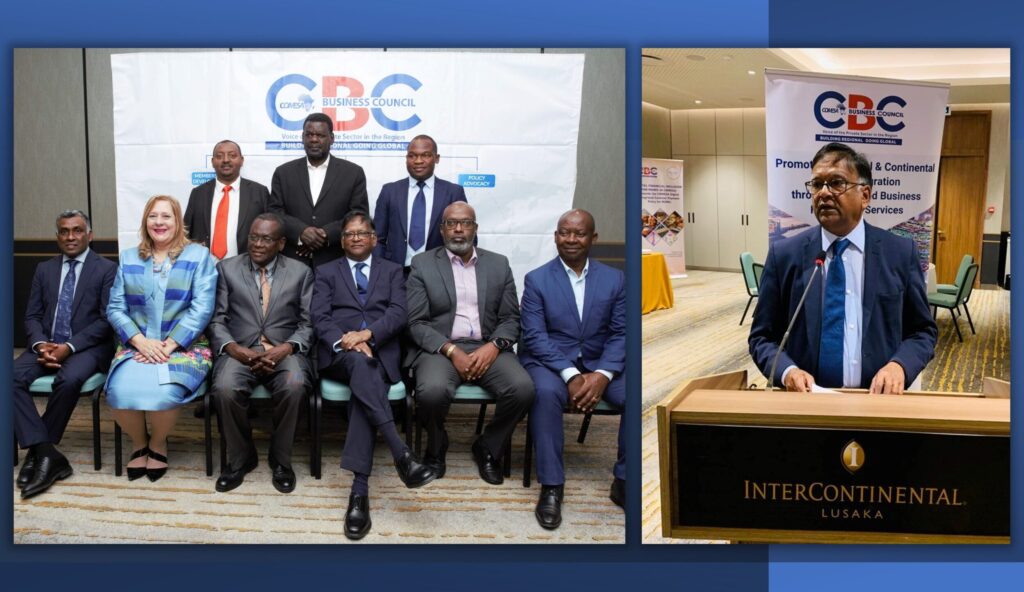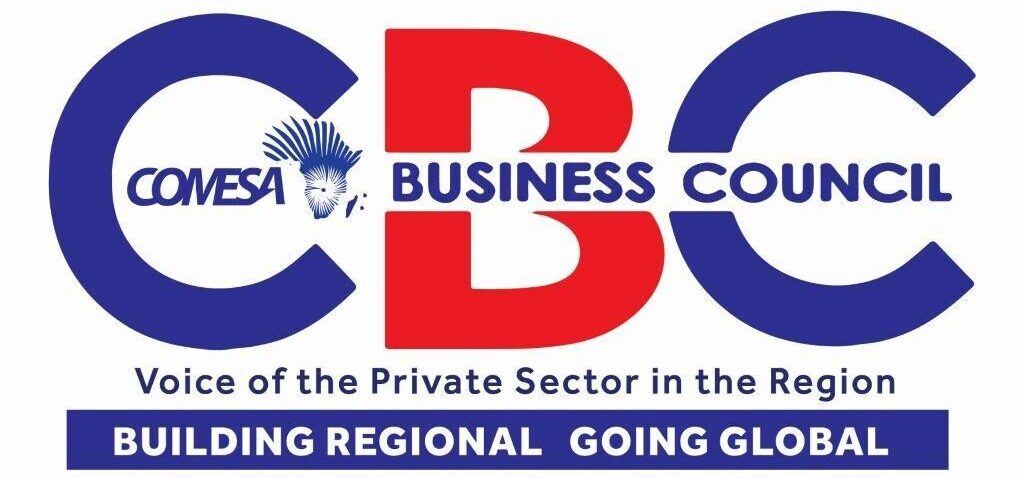
Allow me to start by wishing you all a prosperous 2023!
It is my singular honour and privilege to welcome you all to this Strategy Planning meeting which is being held back-to-back with the 19th meeting of the CBC Board of Directors.
I wish to take this opportunity to express my appreciation and gratitude to the Board of Directors and other attendees for sparing time off their busy schedules to be in Lusaka. This Strategy Planning Meeting is critical in defining the way forward for CBC for the next three years.
Indeed, your presence here is a demonstration of your passion and dedication towards advancing and promoting the interests of the business community and ultimately, regional integration and sustainable economic development across the COMESA Region.
LADIES AND GENTLEMEN,
You will recall that the COMESA Business Council was established to provide the main link in the dialogue between the private sector and other interest groups and organs of the Common Market.
Its aims, among others, were to help create an improved business environment for the implementation of decisions in all economic sectors, providing an opportunity for entrepreneurs to participate actively in improving the policies, regulations and institutions that affect them. This increased participation builds confidence in policy reforms and facilitates the exchange of experience and pooling of resources through, inter alia, cross-border investments.
LADIES AND GENTLEMEN,
Now the big question is, how far have we gone with these objectives?
CBC has played a lead role in advocacy in COMESA. It has developed and advocated for various positions through its workgroups and public-private sector dialogues, on issues relating to the pharmaceutical, manufacturing, and agroindustry sectors, which have been lobbied for at the highest levels of policymaking in COMESA to influence an enabling business environment.
CBC has established various cooperation agreements with development partners who have over the years supported capacity building programmes to address supply and demand side constraints. Notable partners have included BDI, BMGF, CIPE, EU, EU-Africa Rise, ITC, USAID, AfDB, Corporate Council on Africa. Through these partnerships, CBC has been implementing the following innovative programmes with great success:
- Local Sourcing for Partnership (LSP) – Implemented in 10 countries: Kenya, Rwanda, Uganda, Zambia, Malawi, Ethiopia, Madagascar, Tanzania, South Africa and Zimbabwe.
- Regional Code on Anti-corruption Compliance implemented in Ethiopia, Mauritius, Zambia, Rwanda.
- African Trade Observatory Market Analysis Capacity Building Programme- implemented in Zambia, Malawi, Ethiopia and Egypt. About 200 SMEs trained on how to evaluate and export their products to the region.
- Digital Financial Inclusion for SMEs Program piloted in eight countries, namely: Egypt, Ethiopia, Zambia, Rwanda, Kenya, Uganda, Malawi, and Mauritius
LADIES AND GENTLEMEN,
These achievements have, however, not been without challenges.
COMESA total trade has increased by 27% between 2017 to 2021 (from US$301 billion to US$383 billion), despite a drop in 2020 (US$286 billion) due to the pandemic. Nonetheless, our business community continues to face numerous non-tariff barriers while trading in the region. Much remains to be done on this front. Arguably, there has been some progress on trade facilitation and trade governance within the region, but the potential to further bring down trading costs and combat illicit trade is enormous.
The COVID-19 pandemic and the war in Ukraine have caused social and economic upheaval globally. The COMESA region has not been spared. Global and regional supply chains have been severely disrupted, hampering the ability of many suppliers to move materials and products to vendors, even where demand has remained strong. The consequence of this has been drastic rise in prices of energy, agricultural commodities, and metals. Both cost of living and cost of production have been adversely affected.
These external shocks have reached CBC and affected its operation as well. CBC has recorded a decrease in membership renewal and subscriptions in the past years since the start of the pandemic.
Has CBC been effective in influencing policy decisions at COMESA level?
CBC has been active in COMESA Policy Organs meetings, but we need to amplify our actions at various levels, including globally with a range of stakeholders to defend and promote the interest of the COMESA business community. CBC management needs to work closer with its Board Members and its National Focal Points so that pertinent and contemporary issues and challenges can be identified and addressed upfront.
Mobilising financial resources and lack of long-term strategic partnerships for institutional sustainability has been a hurdle over the years. Our core resource base must be widened and deepened, and I look forward to our discussion today on how we can broaden our membership base, develop our partnerships and ensure the long-term sustainability of CBC.
LADIES AND GENTLEMEN,
We should not be deterred. Where there are challenges, therein also lie opportunities. Let me iterate a few.
The Africa Continental Free Trade Area (AfCFTA). CBC is one of the strongest private sector institutions on the continent and is well positioned to drive Private Sector participation in COMESA to contribute to the implementation of the African Continental Free Trade Agreement. CBC can build capacity of SMEs, youth, women in business; advocate for a conducive trade environment in the region, support an e-commerce and a digital agenda for the continent. CBC can lead the way in supporting the business community to put in place measures to mitigate the impact of climate change.
On an international front, there is strong political will for Foreign Direct Investment (FDI) into Africa with particular interest in the pharmaceutical industry, agribusiness, green energy, and digital trade, among others. These opportunities, leveraged by the COMESA private sector, will spur regional and global trade, and also bring a new wave of industrialisation.
This strategy meeting presents an opportunity for CBC to evaluate and analyze its performance over the past five years, as well as to develop new and innovative strategies and mechanisms that will effectively foster private sector development in the COMESA Region and beyond.
I therefore invite you all to fully participate in the discussions through sharing your ideas, insights, reflections that will form basis for development of our new strategy.
As I conclude, allow me to emphasise that economic success cannot happen without promotion of private sector investments and creation of a conducive legal and administrative environment that is friendly to business.
LADIES AND GENTLEMEN,
I therefore urge CBC to continue facilitating the growth of strong business synergies, development of business opportunities and partnerships, including strategic advocacy. This is imperative in the enhancement of trade between and among member states of COMESA and the African continent.
I remain confident that this meeting will culminate in fruitful deliberations and outcomes.
I THANK YOU ALL.
